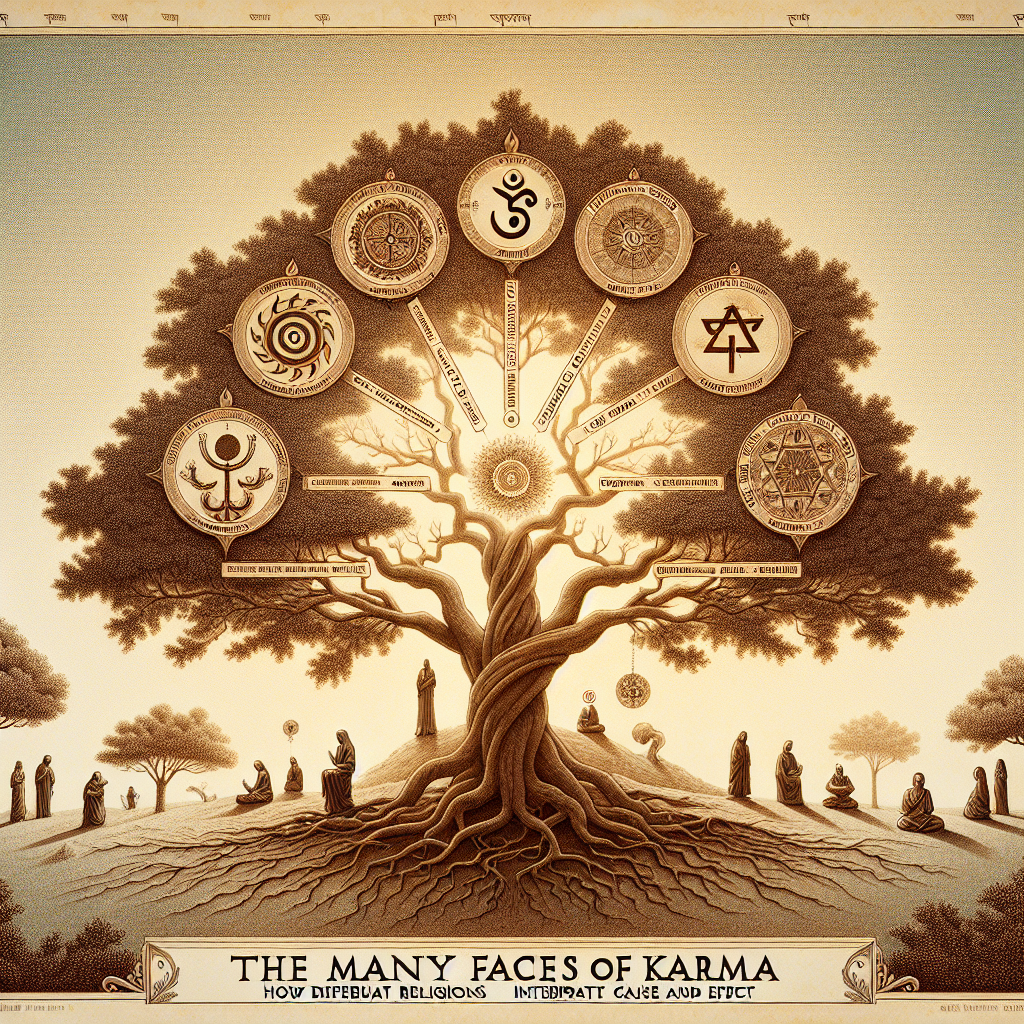The Many Faces of Karma: How Different Religions Interpret Cause and Effect
Karma is a concept that has captivated human thought for millennia, originating in ancient Indian philosophy and spreading across various cultures and religious contexts. In its essence, karma represents the principle of cause and effect, suggesting that an individual’s actions—good or bad—will eventually result in corresponding positive or negative consequences. However, the understanding of karma varies significantly across different religious traditions, weaving a complex tapestry of beliefs that reflect the historical, cultural, and philosophical nuances of each faith. This article aims to explore the many interpretations of karma in several major religions, specifically Hinduism, Buddhism, Jainism, and some aspects of Western traditions.
Karma in Hinduism
In Hinduism, karma is deeply embedded in its cosmology and ethical framework. The term "karma" literally means "action" in Sanskrit, and it encompasses all actions—physical, verbal, and mental. The law of karma is linked intimately to the concepts of dharma (duty/righteousness) and samsara (the cycle of birth, death, and rebirth). Hindus believe that every action has consequences, not just in this life but across multiple lifetimes.
The idea of "punishments and rewards" over many lifetimes forms the basis of the Hindu understanding of karma. Good karma, derived from righteous actions, leads to positive outcomes in the future, while bad karma, arising from unethical actions, results in suffering. This also explains the socio-religious hierarchy prevalent in India; one’s caste is often seen as a result of accumulated karma from previous lives.
Furthermore, the Bhagavad Gita, a sacred Hindu text, offers insights into the relationship between karma and spiritual enlightenment, advocating for the performance of one’s duty selflessly, without attachment to the outcomes.
Karma in Buddhism
Buddhism, which shares roots with Hinduism, also adopts the concept of karma but interprets it through the lens of its unique philosophy. In Buddhism, karma refers not only to actions but also to intentions behind those actions. The ethical weight of an action is considered through the lens of intention, leading to the principle that "intent leads to karma."
Buddhists believe that karma operates within the broader context of the Four Noble Truths and the Eightfold Path, emphasizing the significance of mental states in shaping one’s future. Unlike Hinduism, which places a stronger emphasis on recurrent cycles of rebirth, Buddhism highlights the impermanence of existence. The cessation of suffering—nirvana—can be attained through the right understanding of karma and the cultivation of wholesome thoughts and actions.
In essence, while both Hinduism and Buddhism acknowledge the influence of karma on one’s life, Buddhism shifts the focus from external actions and their societal implications to internal states of mind.
Karma in Jainism
Jainism offers a more intricate understanding of karma. It posits that karma is a physical substance that binds to the soul, affecting its spiritual liberation. The Jains categorize karma into various types, such as ghati (which obscures knowledge and perception) and aghati (which affects physical and emotional well-being). This detailed categorization illustrates the belief that all actions—whether through body, speech, or mind—accumulate karma.
The rigorous ethical guidelines in Jainism, including non-violence (ahimsa) and truthfulness, are intrinsically linked to the notion of karma. Jains believe that by living a life of extreme ethics, one can reduce karmic accumulation and ultimately achieve liberation (moksha). In this context, karma is seen not merely as a consequence of actions but as an active force that can be mitigated through conscious living and self-discipline.
Karma in Western Contexts
While karma predominantly belongs to Eastern philosophies, its principles resonate in certain aspects of Western thought, particularly in spiritual and new-age movements. Many Westerners have adopted the essence of karma as the "law of attraction," suggesting that positive or negative thoughts attract corresponding situations or outcomes.
In Christian theology, the concept of divine justice shares similarities with karma, proposing that good deeds will be rewarded and sinful actions punished, though often in an afterlife setting. Many moral lessons in Christianity emphasize the importance of actions and their consequences, reflecting a system of ethics that, while not explicitly called karma, mirrors the causality intrinsic to the concept.
Common Themes Across Religions
Despite the varied interpretations, several common themes emerge from the understanding of karma across these religions:
Interconnectedness of Actions: All religions agree that actions have implications for oneself and the broader community.
Moral Consequences: There is a universal acceptance that ethical behavior yields beneficial outcomes, while unethical conduct leads to suffering.
Temporal Dynamics: The notions of time and the timing of karmic consequences vary, but all traditions acknowledge that actions can have delayed effects, sometimes spanning multiple lifetimes.
Personal Responsibility: Each belief system emphasizes the importance of personal responsibility, urging individuals to act thoughtfully and ethically.
- Spiritual Growth: Karma is often viewed as a mechanism for spiritual development, a means to learn lessons that lead one closer to enlightenment or ultimate truth.
Conclusion
The concept of karma, steeped in rich historical and cultural contexts, highlights the diverse ways that humanity seeks to understand the relationships between actions, intentions, and their consequences. From the structured rigidity of Jain thought to the philosophical depth of Buddhism and the spiritual introspections in Western contexts, the myriad interpretations of karma present a fascinating exploration of ethics, morality, and spiritual growth. As human societies evolve and intermingle, the dialogue surrounding karma offers an opportunity for deeper understanding and reflection on the complexity of our shared human experience.
FAQs
1. What is karma?
Karma is a philosophical concept that suggests that every action has consequences. Positive actions yield positive outcomes, while negative actions lead to suffering.
2. How does karma differ in Hinduism, Buddhism, and Jainism?
In Hinduism, karma is linked to the cycle of rebirth and dharma. Buddhism emphasizes intention as the key to karmic consequences, while Jainism views karma as a physical substance binding to the soul.
3. Can karma affect our current lives?
Yes, many believe that both good and bad karma can manifest in our current lives, affecting our experiences and relationships.
4. Is karma the same as fate?
Karma is not the same as fate. While karma deals with the consequences of actions, fate entails predetermined events that occur regardless of one’s actions.
5. How can one improve their karma?
Improving karma typically involves engaging in positive actions, practicing kindness, and cultivating a compassionate mindset, often accompanied by ethical living and self-awareness.
It seems like you entered “Prompt” without any additional context. Could you please provide more details or clarify what you’re looking for? Whether it’s a writing prompt, a question, or something else, I’d be happy to help!, #Faces #Karma #Religions #Interpret #Effect, #Faces #Karma #Religions #Interpret #Effect, 1736364696, the-many-faces-of-karma-how-different-religions-interpret-cause-and-effect





